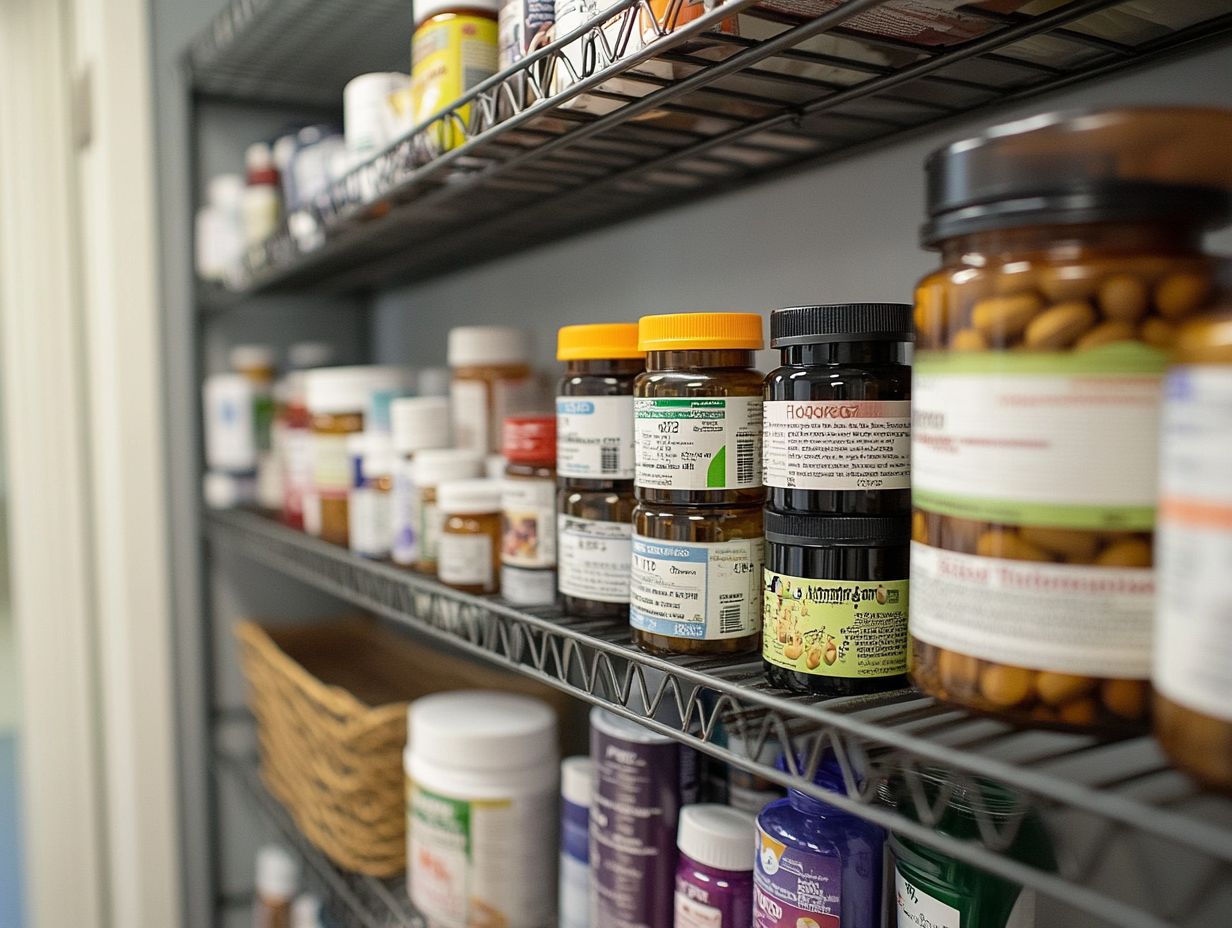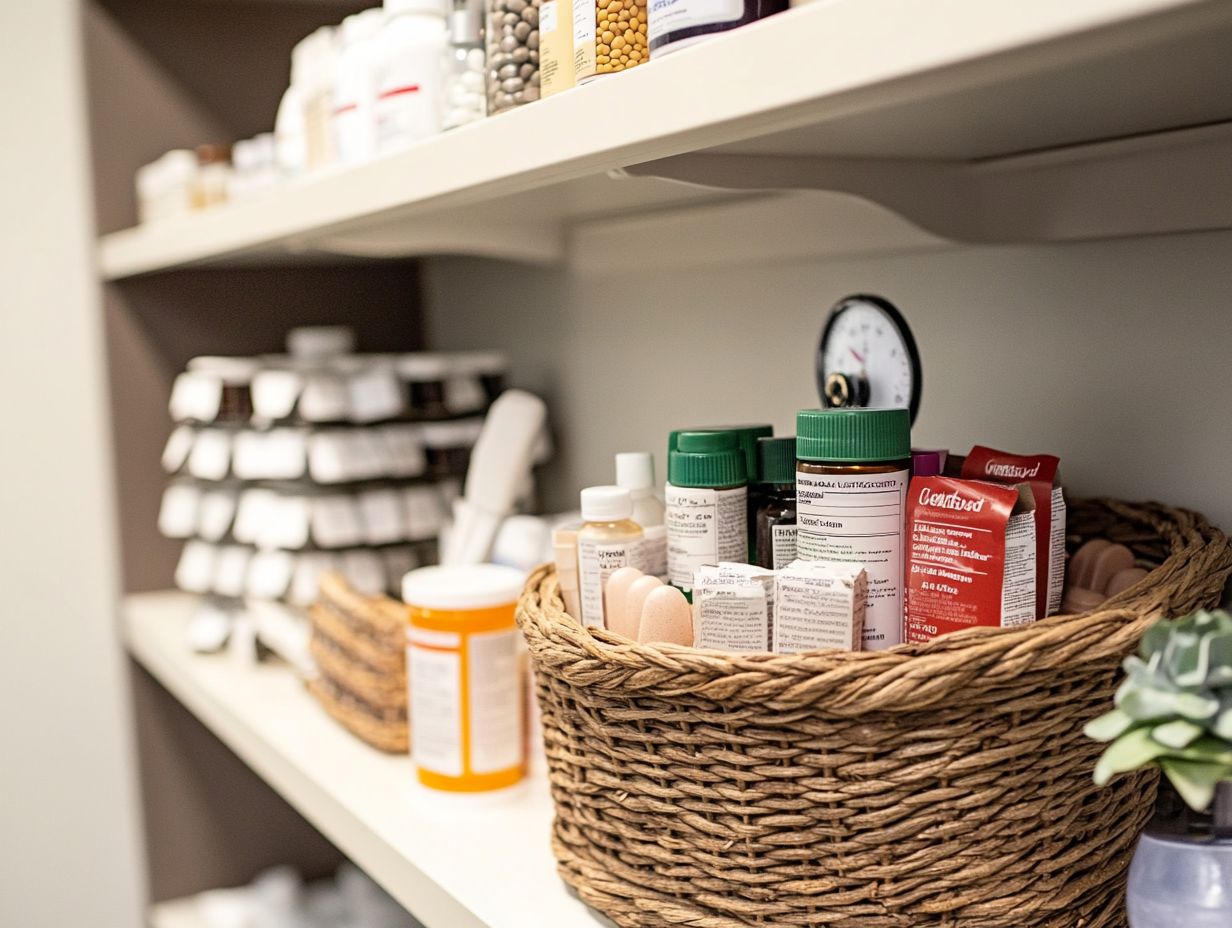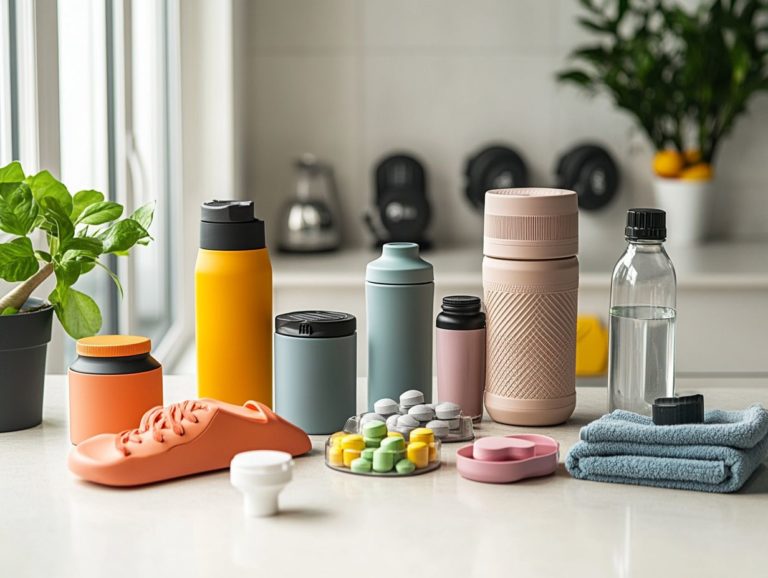10 Tips for Storing Your Supplements Properly
Properly storing your supplements is crucial for maintaining their effectiveness and extending their longevity. By employing the right techniques, you can ensure that your vitamins and minerals remain potent and safe for consumption.
Here are ten essential tips for storing your supplements, covering everything from selecting the ideal environment to keeping them organized and safely out of children’s reach. You will learn about common mistakes and best practices tailored to different types of supplements.
Discover how to safeguard your health investments and make the most of your supplement routine!
Contents
- Key Takeaways:
- 1. Keep Supplements in a Cool, Dry Place
- 2. Avoid Exposure to Sunlight or Heat
- 3. Store Supplements Away from Moisture
- 4. Keep Supplements in Their Original Containers
- 5. Label and Organize Your Supplements
- 6. Store Supplements Out of Reach of Children
- 7. Check Expiration Dates Regularly
- 8. Store Supplements Separately from Medications
- 9. Consider Refrigeration for Certain Supplements
- 10. Do Not Store Supplements in the Bathroom
- Why Is Proper Storage Important for Supplements?
- Frequently Asked Questions
Key Takeaways:

Store supplements in a cool, dry place.
Label and organize supplements to track expiration dates.
Keep supplements away from medications and out of children’s reach.
1. Keep Supplements in a Cool, Dry Place
To preserve the potency and nutritional value of your vitamins and probiotics, store them in a cool, dry place. Moisture can cause problems, leading to vitamin degradation and supplement breakdown.
For instance, vitamins A and D3 thrive in temperatures between 59 F and 77 F, while vitamin C prefers a slightly cooler environment. Keep humidity below 50% to protect your health investments!
Using tightly sealed lids helps maintain that humidity, preventing unwelcome elements from infiltrating the storage container. Avoid cabinet spaces with temperature fluctuations, like those above the stove or near windows.
2. Avoid Exposure to Sunlight or Heat
Exposing your vitamins and supplements to sunlight or heat causes light degradation, severely impacting their efficacy and overall quality. Understanding safe storage practices is essential for maintaining supplement potency.
For example, water-soluble vitamins like vitamin C are particularly vulnerable to breakdown when subjected to light or high temperatures. Fat-soluble vitamins, such as A, D, E, and K, can also lose effectiveness if not stored properly.
Place these crucial nutrients in amber containers or opaque boxes to shield them from harmful UV rays and heat, extending their shelf life and how well your body can use the nutrients.
3. Store Supplements Away from Moisture
Moisture presents a formidable challenge to your supplements, leading to clumping and nutrient loss. It’s essential to minimize moisture exposure to preserve the potency of your vitamins and probiotics.
To effectively combat this issue, consider using drying agents that absorb excess moisture. Additionally, store your supplements in childproof containers to protect them from inquisitive little hands and maintain a moisture-free zone.
Ensure lids are tightly sealed after each use; this simple practice significantly decreases humidity exposure. Regularly monitoring humidity levels in your storage areas is equally crucial. A dehumidifier can help you maintain the ideal balance, ensuring the effectiveness of your supplements remains intact for extended periods.
Start organizing your supplements today for a healthier tomorrow!
4. Keep Supplements in Their Original Containers
Storing your supplements in their original packaging is crucial. These containers are specifically designed to preserve the quality of your supplements, protecting them from moisture, light, and other elements that could compromise their effectiveness.
The labels on the packaging provide essential storage instructions, guiding you on the optimal conditions like temperature and humidity levels to maintain effectiveness.
Proper handling is key. Keeping the containers tightly closed and storing them in a cool, dark place can significantly extend the shelf life of your vitamins and probiotics.
By following these best practices, you can ensure you re reaping the maximum benefits from your supplements, free from contamination and degradation.
5. Label and Organize Your Supplements
Properly labeling and organizing your vitamin supplements is essential for easily locating what you need, tracking expiration dates, and maintaining the integrity of your health regimens.
Consider marking each supplement container clearly with its expiration date and storage instructions like store in a cool, dry place or refrigerate after opening. This approach facilitates effective tracking and minimizes the risk of consuming outdated products.
Arrange your supplements by how often you use them, placing the most frequently taken items at eye level for effortless access.
And don t forget: all supplements should be stored securely out of reach of children, perhaps in a high cabinet or locked storage, ensuring safety while you stay committed to your wellness goals.
6. Store Supplements Out of Reach of Children

To ensure the safety of your children, it’s essential to store all vitamins and supplement products out of their reach preferably in high cabinets or locked containers. This simple measure significantly reduces the risk of accidental ingestion and promotes safe storage practices.
This proactive approach protects curious little hands and creates a safe environment. It s equally important to have conversations with your children about the potential dangers associated with these items.
You can explain that while vitamins are beneficial, taking too many can lead to serious health issues. Using straightforward language and relatable examples will help them grasp the concept more easily.
Regularly checking these storage areas is vital to ensure that labels are intact and no expired products are lurking around. These routine assessments serve as a crucial line of defense against accidental exposures.
7. Check Expiration Dates Regularly
Regularly checking the expiration dates on your vitamins and supplements is crucial to prevent breakdowns and ensure you re ingesting products that retain their nutritional value and effectiveness.
Being able to read labels effectively gives you the power to make informed health choices. Many products come with a ‘best by’ or ‘use by’ date, indicating the timeframe during which they are expected to remain effective.
After this date, while some supplements may still be safe to consume, their effectiveness could decrease significantly. If you find that a supplement has expired, it’s best to dispose of it properly to avoid any unintentional ingestion.
Utilizing local pharmaceutical take-back programs or household hazardous waste collection sites offers safe disposal options, encouraging responsible waste management and helping to protect the environment from potential contaminants.
8. Store Supplements Separately from Medications
Store your vitamins and dietary supplements separately from medications now to protect your health! This practice ensures proper handling and minimizes the risk of contamination or confusion in your health regimen.
This separation is crucial because it helps prevent potential interactions that could undermine effectiveness. It also makes it easy for you to identify each product when you need it.
For example, some active ingredients in supplements may disrupt the absorption of certain medications, leading to unintended health issues. Clearly labeling your containers can enhance safety and organization.
Using storage solutions like divided pill organizers or dedicated shelves can streamline your daily routine and reduce the chances of mixing things up.
By adopting a systematic approach to storage, you’ll confidently take charge of your health!
9. Consider Refrigeration for Certain Supplements
For specific vitamins like vitamin D3 and probiotic supplements, refrigeration can be a smart choice. Cool temperatures help maintain their effectiveness and extend their shelf life, ensuring you get the most out of your health investment.
To maximize their effectiveness, store these supplements in containers that keep air out. This prevents moisture from sneaking in and compromising their quality.
Regularly check the labels, as some supplements may have unique storage requirements beyond just temperature. Maintaining a consistent temperature in a dry environment is crucial for preserving nutrients.
Follow these guidelines to ensure your supplements remain effective and ready to support your overall health.
10. Do Not Store Supplements in the Bathroom
Storing supplements in the bathroom is typically a poor choice due to the high humidity and moisture that can compromise the quality of your vitamins and health supplements over time.
When these products are exposed to such conditions, they may lose their effectiveness. Ideally, keep these essential items in a cool, dark place, away from direct sunlight.
The temperature fluctuations that come with daily bathroom use can hasten their deterioration. Instead, consider a kitchen cabinet, pantry, or a dedicated shelf in your bedroom or office.
These alternatives provide a stable environment, helping to preserve the integrity of your supplements and ensuring that your commitment to health is backed by optimal product quality.
Why Is Proper Storage Important for Supplements?
Proper storage of your supplements is essential for preserving the quality and effectiveness of the vitamins and nutrients that play a crucial role in your health regimen and dietary choices.
When nutrients are exposed to unsuitable storage conditions, like excessive heat or humidity, they can gradually lose their effectiveness. Take vitamin C, for instance; it is particularly sensitive to light and can degrade rapidly in sunlight.
Similarly, water-soluble vitamins like B6 and B12 lose effectiveness in high-moisture environments. This degradation not only undermines the nutritional value of your supplements but could also negatively impact your overall health.
Recognizing these implications underscores the importance of maintaining optimal storage practices for your supplements.
What Are the Common Mistakes People Make When Storing Supplements?

Many individuals inadvertently fall into common storage traps that can lead to vitamin degradation and diminished supplement potency. Frequent missteps include neglecting to read labels, improperly sealing containers, and overlooking temperature fluctuations.
Exposing supplements to excessive light or moisture can dramatically undermine their effectiveness. To avoid these pitfalls, always check expiration dates and ensure that containers are tightly closed after each use.
Storing your supplements in cool, dark places away from humidity can significantly enhance their longevity and efficacy. Remember, the environment in which you keep your supplements plays a crucial role in preserving their intended benefits, ultimately supporting your overall health and wellness.
What Are the Best Containers for Storing Supplements?
The best containers for storing supplements are amber or childproof options. These containers are designed to maintain the quality of your supplements by protecting them from harmful light and keeping them out of reach of children.
In addition to these features, materials like glass or high-quality plastics act as effective barriers against moisture, which can spoil your supplements over time.
The thoughtful design of these containers, complete with airtight seals or desiccant inserts, further protects the contents from environmental factors that can lead to spoilage.
When you choose containers with ergonomic designs, you enhance usability and ensure easy access to your supplements while maintaining important safety measures, especially in homes with children.
How Can You Tell If a Supplement Has Gone Bad?
Identifying whether a supplement has gone bad is vital for maintaining its effectiveness.
Watch for these common signs:
- Changes in color
- Unusual smell
- Altered texture
- Clumping
Don’t forget to check the expiration date; consuming outdated products can lower their effectiveness or lead to health risks.
When examining labels, be alert for unusual sediment, separation of ingredients, or faded print these can indicate poor storage conditions.
By familiarizing yourself with these warning signs, you’re not just protecting your health; you re ensuring that your supplements are safe and effective.
Regularly checking your supplements is more than just a precaution; it s a commitment to preserving their potency and taking charge of your health.
This habit can significantly enhance your wellness journey.
How Can You Store Supplements for Travel?
Storing your supplements the right way is essential for your health and wellness, especially when traveling. Keep them in their original packaging and store them in a cool, dry place.
Packing your supplements in a sturdy, sealable bag or container is a practical step to prevent spills or damage. If you’re flying, make sure to keep these items in your carry-on luggage to avoid extreme temperature swings that can occur in checked baggage.
Given the humidity and potential moisture you might encounter, using desiccant packets is a smart choice to protect your supplements.
If you re crossing time zones, organizing a schedule for when to take each supplement will help you maintain your routine and consistency.
What Are the Best Practices for Storing Liquid Supplements?
Liquid supplements need specific storage practices to ensure proper handling and extend their shelf life. It’s vital to keep them tightly sealed and refrigerate them when necessary.
These protocols are essential since liquid formulas can spoil quickly when exposed to heat and light. By keeping the appropriate temperature in your refrigerator and making sure the lids are securely fastened, you can minimize the risk of bacterial growth and oxidation.
Be aware that some supplements may have unique requirements, such as avoiding direct sunlight or areas with high humidity. Following these guidelines not only preserves your supplements potency but also enhances their effectiveness.
Frequently Asked Questions
What are the best ways to store my supplements?

1. Keep them in a cool, dry place. Heat and moisture can degrade supplements. Store them away from direct sunlight.
2. Use airtight containers. Oxygen can affect the quality of supplements. Make sure to store them in containers that seal tightly.
3. Keep them away from light. Light exposure can break down some supplements. Store them in a dark cabinet or drawer.
4. Avoid storing in the bathroom. Bathrooms can be humid and warm, which are not ideal for supplements.
5. Regularly check expiration dates. Discard any supplements that are expired to ensure safety.
6. Store out of reach of children. This prevents accidental ingestion and keeps them safe.
Can I store my supplements in the refrigerator?
Yes, refrigeration can extend the shelf life of some heat-sensitive supplements.
What is the best temperature for storing supplements?
Most should be stored at room temperature, between 59-77 F. Check the label for specific storage requirements.
Do I need to keep my supplements in their original packaging?
Yes, the original packaging protects against light, moisture, and air. If transferring, ensure the new container is airtight and labeled.
How long can I store my supplements?
The shelf life varies. Always check the expiration date. Some last over a year, while others may expire within months.
What happens if I don’t store my supplements properly?
Poor storage can lead to loss of strength and effectiveness. They may even become harmful if exposed to moisture or heat for too long. Always follow storage guidelines to keep your supplements safe.






